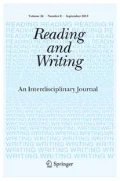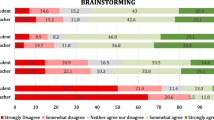Abstract
This study investigated the syntactic ability of 82 struggling adult readers who recognize words between the third and fifth grade levels. Analysis of the adults’ performance on the TOLD-I:3 indicated that they were deficient on the syntactic task. Correlations found the struggling adult readers’ oral language skills, written language skills, and reading comprehension skills to be related. A regression analyses indicated that the adults’ syntactic knowledge did not individually predict reading comprehension, however their other oral language skills did. The findings of this study suggest that the adults performed similar to children who are either learning to read or considered poor readers. This study also contributes to the adult literacy field by providing exploratory information on an area (syntax and struggling adult readers) that is lacking.

Similar content being viewed by others
Notes
This paper represents part of a larger study funded by the Eunice Kennedy Shriver National Institute of Child Health and Human Development, the National Institute for Literacy, and the U.S. Department of Education, Office of Vocational and Adult Education* grant # R01HD43801.
Analyses were also conducted using raw scores, with identical results found. .
References
Akhtar, N. (1999). Acquiring basic word order: Evidence for data-driven learning of syntactic structure. Journal of Child Language, 26, 339–356.
Barrett, M. (1999). An introduction to the nature of language and to the central themes and issues in the study of language development. In M. Barrett (Ed.), The development of language (pp. 1–23). University of Surrey, UK: Psychology Press.
Bentin, S., Deutsch, A., & Liberman, I. Y. (1990). Syntactic competence and reading ability in children. Journal of Experimental Child Psychology, 49, 147–172.
Binder, K., & Borecki, C. (2007). The use of phonological, orthographic, and contextual information during reading: A comparison of adults who are learning to read and skilled adult readers. Reading and Writing: An Interdisciplinary Journal, 21, 843–858.
Byrne, M. E., Crowe, T. A., Hale, S. T., Meek, E. E., & Epps, D. (1996). Metalinguistic and pragmatic abilities of participants in adult literacy programs. Journal of Communication Disorders, 29, 37–49.
Cain, K. (2007). Syntactic awareness and reading ability: Is there any evidence for a special relationship? Applied Psycholinguistics, 28, 679–694.
Cleland, A. A., & Pickering, M. J. (2006). Do writing and speaking employ the same syntactic representations? Journal of Memory and Language, 54, 185–198.
Cupples, L., & Holmes, V. M. (1992). Evidence for a difference in syntactic knowledge between skilled and less skilled adult readers. Journal of Psycholinguistic Research, 21, 249–274.
Davidson, R. K., & Strucker, J. (2002). Patterns of word recognition errors among adult basic education native and nonnative speakers of English. Scientific Studies of Reading, 6, 299–316.
Dietrich, J. A., & Brady, S. A. (2001). Phonological representations of adult poor readers: An investigation of specificity and stability. Applied Psycholinguistics, 22, 383–418.
Dunn, L. M., & Dunn, L. M. (1998). Peabody picture vocabulary test (3rd ed.). Circle Pines, MN: American Guidance Service.
Ferreira, F., & Engelhardt, P. E. (2006). Syntax and production. In M. Traxler & A. Gernsbacher (Eds.), Handbook of psycholinguistics (pp. 61–91). Oxford, UK: Elsevier: Inc.
Gillon, G., & Dodd, B. (1995). The effects of training phonological, semantic, and syntactic processing skills in spoken language on reading ability. Language, Speech, and Hearing Services in Schools, 26, 58–68.
Greenberg, D., Ehri, L. C., & Perin, D. (1997). Are word-reading processes the same or different. Journal of Educational Psychology, 89, 262–275.
Greenberg, D., Ehri, L. C., & Perin, D. (2002). Do adult literacy students make the same word-reading and spelling errors as children matched for word-reading age? Scientific Studies of Reading, 6, 221–243.
Greenberg, D., Pae, H., Morris, R., Calhoon, M. B., & Nanda, A. (2009). Measuring adult literacy students’ reading skills using the gray oral reading test. Annals of Dyslexia, 59, 133–149.
Greenberg, D., Wise, J., Morris, R., Fredrick, L., Nanda, A., Pae, H., et al. (2011). A randomized-control study of instructional approaches for struggling adult readers. Journal of Research on Educational Effectiveness, 4, 101–117.
Hammill, D. D., & Newcomer, P. L. (1997). Test of language development, intermediate (3rd ed.). Austin, TX: Pro-Ed.
Hartsuiker, R. J., & Westenberg, C. (2000). Word order priming in written and spoken sentence production. Cognition, 75, B27–B39.
Hoff, E. (2009). Language development (4th ed.). California: Wadsworth.
Hoover, W. A., & Gough, P. B. (1990). The simple view of reading. Reading and Writing: An Interdisciplinary Journal, 2, 127–160.
Kaplan, E., Goodglass, H., & Weintraub, S. (2001). Boston naming test. Baltimore: Lippincott Williams & Williams.
Layton, A., Robinson, J., & Lawson, M. (1998). The relationship between syntactic awareness and reading performance. Journal of Research in Reading, 21, 5–23.
MacArthur, C. A., Greenberg, D., Mellard, D., & Sabatini, J. (2010). Models of reading component skills in low literate adults. Journal of Learning Disabilities, 43, 99–100.
Mokhtari, K., & Thompson, H. B. (2006). How problems of reading fluency and comprehension are related to difficulties in syntactic awareness skills among fifth graders. Reading Research and Instruction, 46, 73–94.
Muter, V., Hulme, C., Snowling, M. J., & Stevenson, J. (2004). Phonemes, rimes, vocabulary, and grammatical skills as foundations of early reading development: Evidence from a longitudinal study. Developmental Psychology, 40, 665–681.
Nanda, A., Greenberg, D., & Morris, R. (2010). Modeling child-based theoretical constructs with struggling adult readers. Journal of Learning Disabilities, 43, 139–153.
Nation, K. (2004). Children’s reading comprehension difficulties. In M. J. Snowling & C. Hulme (Eds.), The Science of Reading: A Handbook (pp. 248–265). Malden, MA: Malden Blackwell.
Nation, K., & Snowling, M. J. (2000). Factors influencing syntactic awareness skills in normal readers and poor comprehenders. Applied Psycholinguistics, 21, 229–241.
National Institute of Child Health, Human Development. (2000). Report of the national reading panel. Teaching children to read: An evidence-based assessment of the scientific research literature on reading and its implications for reading instruction (NIH Publication No. 00–4769). Washington, DC: US Government Printing Office.
Nippold, M. A., Hesketh, L. J., Duthie, J. K., & Mansfield, T. C. (2005). Conversational versus expository discourse: A study of syntactic development in children, adolescents, and adults. Journal of Speech, Language & Hearing Research, 48, 1048–1064.
Nippold, M. A., Mansfield, T. C., & Billow, J. L. (2007). Peer conflict explanations in children, adolescents, and adults: Examining the development of complex syntax. American Journal of Speech-Language Pathology, 16, 179–188.
Sabatini, J. P., Sawaki, Y., Shore, J. R., & Scarborough, H. S. (2010). Relationships among reading skills of adults with low literacy. Journal of Learning Disabilities, 43, 122–138.
Simms, R. B., & Crump, W. D. (1983). Syntactic development in the oral language of learning disabled and normal students at the intermediate and secondary level. Learning Disability Quarterly, 6, 155–161.
The Psychological Corporation. (1997). WAIS-III: Administration and scoring manual. San Antonio, TX: Harcourt Brace.
Tomasello, M., & Brooks, P. J. (1999). Early syntactic development: A construction grammar approach. In M. Barrett (Ed.), The development of language (pp. 161–186). University of Surrey, UK: Psychology Press.
Torgesen, J. K., Wagner, R. K., & Rashotte, C. A. (1994). Longitudinal studies of phonological processing and reading. Journal of Learning Disabilities, 27, 276–286.
Wagner, R. K., Torgesen, J. K., & Rashotte, C. A. (1999). The comprehensive test of phonological Awareness. Austin, TX: Pro-Ed.
Woodcock, R. W., McGrew, K. S., & Mather, N. (2001). Woodcock-Johnson III: Tests of achievement. Itasca, Il: Riverside Publishing.
Author information
Authors and Affiliations
Corresponding author
Rights and permissions
About this article
Cite this article
Taylor, N.A., Greenberg, D., Laures-Gore, J. et al. Exploring the syntactic skills of struggling adult readers. Read Writ 25, 1385–1402 (2012). https://doi.org/10.1007/s11145-011-9324-9
Published:
Issue Date:
DOI: https://doi.org/10.1007/s11145-011-9324-9




